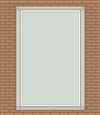Home Site Map - Techniques - Structure -
Stucco Bricking
![]() Creating the look of brick masonry without the cost and earthquake
risk.
Creating the look of brick masonry without the cost and earthquake
risk.
The look

Products
I decided to use acrylic rather than traditional cement stucco because it is very much lighter and so doesn't need a metal lathe to transfer its weight into the wall structure. Acrylic is applied in a much thinner layer and is naturally lighter so does not need a metal lathe. It also sticks well to the polystyrene surface. It is also somewhat rubbery so does not develop cracks.
The official term is "Textured acrylic finish system" (TAFS).
Make sure the TAFS products used are breathable so that water does not get trapped behind.
These are the two major products that I chose.


Bob Rumbaugh Acrylall, LLC
3120 46th. Ave. N.
St. Petersburg,
Fl. 33714
bob@acrylall.com
727-528-1287
First apply the Garrison and then apply the Bastion.
EPS surface
The wall has EPS sheeting on the outside of the ICF. This leaves a uniform flat EPS surface, but with indents where the screws with big washers have been used to hold it on. The positioning of the screws is important to ensure that the screws are under the bricks.
To create the bricks, half inch thick EPS sheet is cut into brick sized rectangles.
Other details
Brick size
In the UK, the usual size of a modern brick is 8-5⁄8 × 2-5⁄8 inches, which with a nominal 3⁄8 inch mortar joint, forms a unit size 9 × 3 inches.
In the
In USA modern bricks are usually about 8 × 2 1⁄4 inches, which with a nominal 3⁄8 inch mortar joint, forms a unit size
8-3/8 × 2-5/8 inches.
My choice is to use the UK standard (slightly larger bricks) so my bricks are 8-5/8" x 2-5/8" and are installed on a 9" x 3" grid. Allowing for 1/8" stucco thickness round the edge, that means the EPS brick pieces are 8-3/8" x 2-3/8".
The brick pattern is offset by 4.5". So that means the brick depth is 4-1/8".
Brick look examples
These examples of brick styles are presented with what I consider the best look at the top.
The following has nice mortar color and nicely defined bricks. Possibly the brick color is a bit too pale...

In the following the bricks are a bit too beaten up...

In the following the mortar is a bit too yellowy...

The following has a nice brick color, but the mortar is a bit too flush with the surface. This style would be applicable if not using stick on EPS brick faces.

The following is a bit too multicolored. With different colors you need to be too careful to make the bricks look random...

This one is too pale...

This one is too loud...

The best color for mortar is "standard gray Type S mortar".
My window surround design

One of the nice things that come from applying stucco over a brick contoured surface is that the stucco is well supported and so there is no risk of a sheet of stucco breaking away and falling off the wall.
Details of Fiberglass Mesh used.



